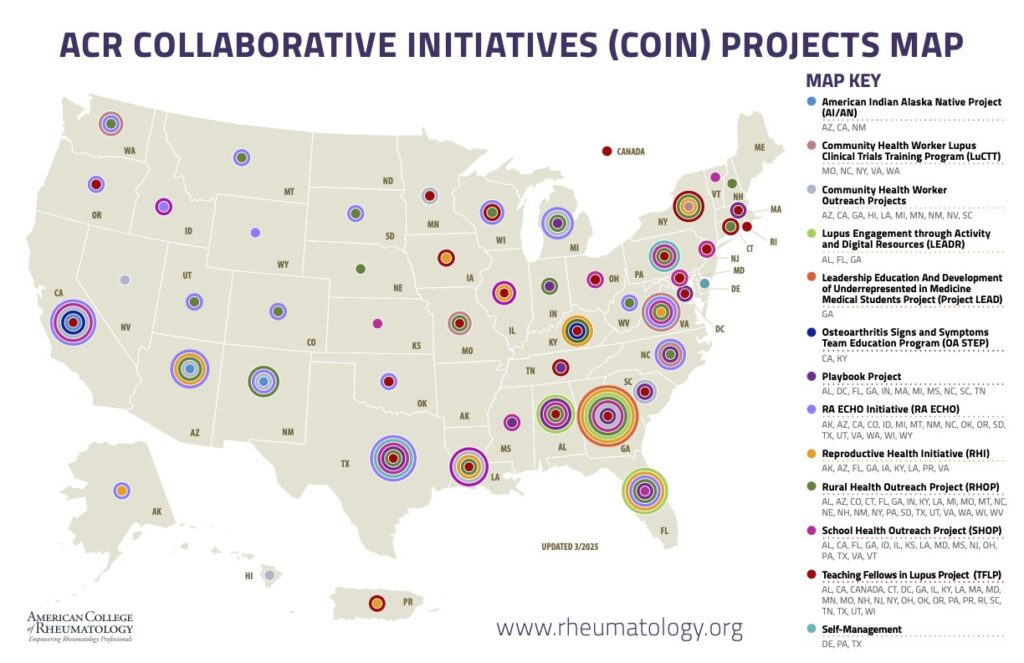The ACR’s Collaborative Initiatives (COIN) Committee works to advance the field of rheumatology by using rheumatic diseases as case studies for treating disease, advancing health equity, eliminating health disparities and improving the quality of patient lives. COIN pursues this mission through program implementation, including special projects and collaborations with ACR departments, members and partner organizations.
Since 2009, COIN has secured more than $22 million in external funding from agencies such as the Centers for Disease Control & Prevention (CDC) and the U.S. Office of Minority Health (OMH). These funds have enabled a wide portfolio of projects.
 COIN’s programs prioritize raising awareness of rheumatic diseases, addressing disparities in rheumatology and decreasing time to diagnosis. Projects and topics are guided by member input and benefit the ACR by generating a steady flow of innovative resources connected to the mission. Members also gain opportunities to support causes they are passionate about while building professional development experience.
COIN’s programs prioritize raising awareness of rheumatic diseases, addressing disparities in rheumatology and decreasing time to diagnosis. Projects and topics are guided by member input and benefit the ACR by generating a steady flow of innovative resources connected to the mission. Members also gain opportunities to support causes they are passionate about while building professional development experience.
“COIN’s projects center on supporting rheumatology providers so they can be there for their patients with rheumatic disease,” explains Starla Blanks, senior director of the Collaborative Initiatives division. “In that way, we fill a specific need in the rheumatology care ecosystem.”
Supporting Rheumatologists & Empowering Patients
One current area of focus is Systemic Erythematosus Lupus (SLE). COIN’s efforts have shown that bolstering awareness of rheumatic conditions among the primary care team is vital to fill the gap between medical education and practice—particularly for conditions not regularly recognized by primary care providers—and may ultimately lead to a decreased time till diagnosis.
This provider focus naturally overlaps with patient care. A recently launched resource, Lupus Empowerment through Action and Planning (LEAP), demonstrates this principle.
LEAP is an online activity for adults living with SLE that engages patients with their disease self-management planning and action.
“Patients often leave the clinic with more questions than answers. Self-management tools, such as the ACR has created with LEAP, help bridge that gap,” says Noelle Rolle, COIN chair and assistant professor, Medical College of Georgia, Augusta. “LEAP was designed to complement the care patients receive in the clinical setting.”
Improving Care with New SLE Quality Measures
Starting in 2026, the newest grant-supported resources will be four new SLE quality measures in the ACR’s Rheumatology Informatics System for Effectiveness (RISE) registry:
- Hydroxychloroquine Use in Patients with Systemic Lupus Erythematosus
- Avoiding the Prolonged Use of Moderate/High Dose Glucocorticoids for Patients with Systemic Lupus Erythematosus
- Screening for Lupus Nephritis in Patients with Systemic Lupus Erythematosus
- Patient Reported Outcome (PRO) Physical Function Survey for Patients with Rheumatology Conditions
Developed over the past 18 months, these measures will be accessible in all RISE dashboards in January 2026. The COIN and RISE teams are awaiting confirmation from the CMS about whether these will qualify as reportable measures for the Quality Payment Program through RISE.


